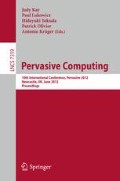Abstract
Researchers in pervasive and ubiquitous computing have produced much work on new sensing technologies for disaggregating domestic resource consumption, and on designs for energy-centric interventions at home. In a departure from this, we employ a service-oriented approach, where we account for not only the amount of resources that specific appliances draw upon, but also how the associated services may be characterised in the context of everyday life. We undertook a formative study in four student flats over a twenty-day period, collecting data using interviews with eleven participants and over two hundred in-home sensors. Following an in-depth description of observations and findings from our study, we argue that our approach provides a more inclusive range of understandings of resources and everyday life than has been shown from energy-centric approaches.
Access this chapter
Tax calculation will be finalised at checkout
Purchases are for personal use only
Preview
Unable to display preview. Download preview PDF.
References
Brynjarsdóttir, H., Hȧkansson, M., Pierce, J., Baumer, E.P., DiSalvo, C., Sengers, P.: Sustainably unpersuaded: How persuasion narrows our vision of sustainability. In: Proc. of CHI (2012)
Chetty, M., Brush, A.B., Meyers, B.R., Johns, P.: It’s not easy being green: understanding home computer power management. In: Proc. of CHI, pp. 1033–1042 (2009)
Darby, S.: The effectiveness of feedback on energy consumption. Tech. rep., Environmental Change Institute, University of Oxford (2006)
DiSalvo, C., Sengers, P., Brynjarsdóttir, H.: Mapping the landscape of sustainable HCI. In: Proc. of CHI, pp. 1975–1984 (2010)
Froehlich, J., Larson, E., Gupta, S., Cohn, G., Reynolds, M., Patel, S.: Disaggregated end-use energy sensing for the smart grid. IEEE Pervasive Computin 10(1), 28–39 (2011)
Gram-Hanssen, K.: Residential heat comfort practices: understanding users. Building Research and Information 38(2) (2010)
Green, K., Vergragt, P.: Towards sustainable households: a methodology for developing sustainable technological and social innovations. Futures 34, 381–400 (2002)
Hackett, B., Lutzenhiser, L.: Social structures and economic conduct: Interpreting variations in household energy consumption. Sociological Forum 6, 449–470 (1991)
Hayes, S.C., Cone, J.D.: Reducing residential electrical energy use: payments, information, and feedback. J. Appl. Behav. Anal. 10(3), 425–435 (1977)
Pierce, J., Fan, C., Lomas, D., Marcu, G., Paulos, E.: Some consideration on the (in)effectiveness of residential energy feedback systems. In: Proc. of DIS, pp. 244–247 (2010)
Pierce, J., Paulos, E.: Beyond energy monitors: Interaction, energy, and emerging energy systems. In: Proc. of CHI (2012)
Pierce, J., Schiano, D.J., Paulos, E.: Home, habits, and energy: Examining domestic interactions and energy consumption. In: Proc. of CHI (2010)
Shove, E.: Beyond the ABC: Climate change policy and theories of social change. Environment and Planning A 42(6), 1273–1285 (2010)
Shove, E.: Comfort, Cleanliness and Convenience: The Social Organization of Normality, Berg, Oxford, UK (2003)
Sonderegger, R.C.: Movers and stayers: The resident’s contribution to variation across houses in energy consumption for space heating. Energy and Buildings 1(3), 313–324 (1978)
Strengers, Y.A.: Designing eco-feedback systems for everyday life. In: Proc. of CHI, pp. 2135–2144 (2011)
Wall, R., Crosbie, T.: Potential for reducing electricity demand for lighting in households: An exploratory socio-technical study. Energy Policy 37(3), 1021–1031 (2009)
Warde, A.: Consumption and theories of practice. Journal of Consumer Culture 5(2), 131–153 (2005)
Zimmermann, J.P.: End-use metering campaign in 400 households in Sweden. Contract 17-05-2743 for Swedish Energy Agency, Enertech (September 2009)
Author information
Authors and Affiliations
Editor information
Editors and Affiliations
Rights and permissions
Copyright information
© 2012 Springer-Verlag Berlin Heidelberg
About this paper
Cite this paper
Bates, O., Clear, A.K., Friday, A., Hazas, M., Morley, J. (2012). Accounting for Energy-Reliant Services within Everyday Life at Home. In: Kay, J., Lukowicz, P., Tokuda, H., Olivier, P., Krüger, A. (eds) Pervasive Computing. Pervasive 2012. Lecture Notes in Computer Science, vol 7319. Springer, Berlin, Heidelberg. https://doi.org/10.1007/978-3-642-31205-2_8
Download citation
DOI: https://doi.org/10.1007/978-3-642-31205-2_8
Publisher Name: Springer, Berlin, Heidelberg
Print ISBN: 978-3-642-31204-5
Online ISBN: 978-3-642-31205-2
eBook Packages: Computer ScienceComputer Science (R0)

